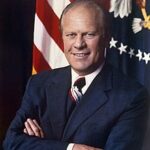The Decision to Heal America
On September 8, 1974, President Gerald Ford made one of the most controversial decisions in American history. He granted a presidential pardon to Richard Nixon for all federal crimes related to Watergate. The decision came just one month after Ford assumed the presidency following Nixon’s resignation.
Historical Context and Motivation
Ford inherited a nation deeply divided by the Watergate scandal. ⚠️ The constitutional crisis had paralyzed the government for months. Ford believed that prosecuting Nixon would further divide the country and prevent healing. The presidential pardon aimed to restore public confidence in government institutions.
The Announcement
Ford announced the decision in a televised address from the Oval Office. He stated that Nixon had suffered enough through resignation and public humiliation. 📊 Polls showed 71% of Americans opposed the pardon initially. Ford acknowledged the controversy but prioritized national unity over political popularity. The decision reflected his belief that America needed to move forward from Watergate.
Impact:
Immediate Political Consequences
The presidential pardon triggered fierce political backlash across the nation. 🔥 Ford’s approval ratings plummeted from 71% to 50% within days. Democrats accused him of making a secret deal with Nixon. Congressional investigations examined whether Ford had promised the pardon in exchange for Nixon’s resignation. The controversy dominated Ford’s presidency and likely cost him the 1976 election.
Long-term Historical Assessment
Historians now view Ford’s presidential pardon more favorably than contemporary critics did. 📉 The decision prevented years of divisive legal proceedings that could have further damaged American institutions. Ford’s sacrifice of his political career for national healing demonstrates presidential courage. The pardon allowed the country to focus on pressing economic and foreign policy challenges rather than remaining mired in Watergate.
Constitutional and Precedential Significance
The Nixon pardon established important precedents for presidential clemency power. 🌍 It demonstrated that presidents could use pardons to address national crises, not just individual cases. Legal scholars debate whether the pardon was constitutional since Nixon faced no formal charges. The decision influenced how future presidents approached politically sensitive pardons and clemency decisions.
